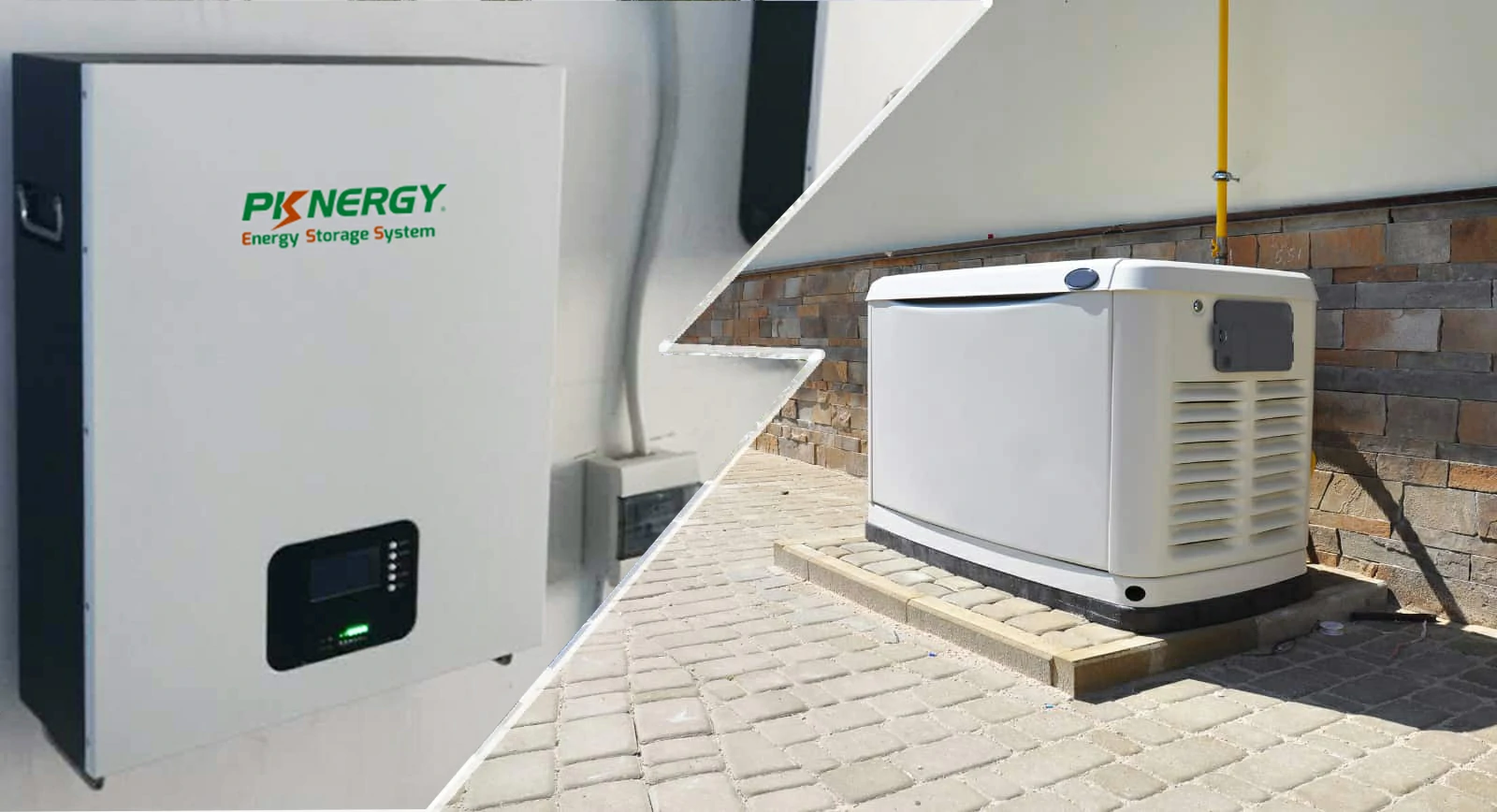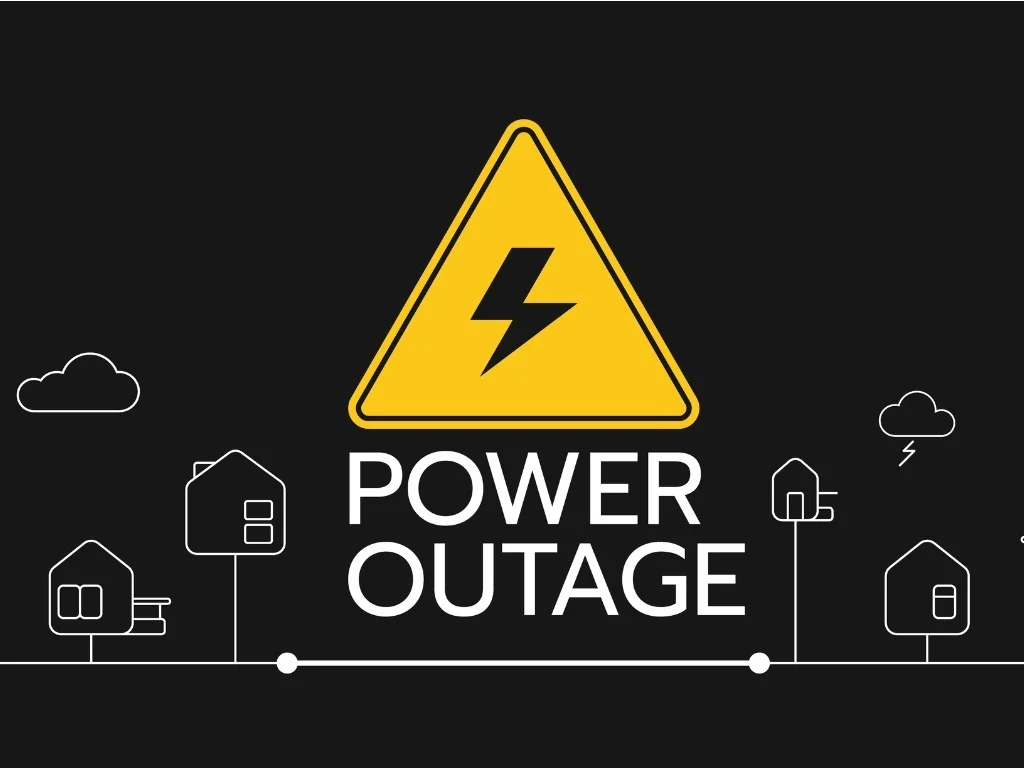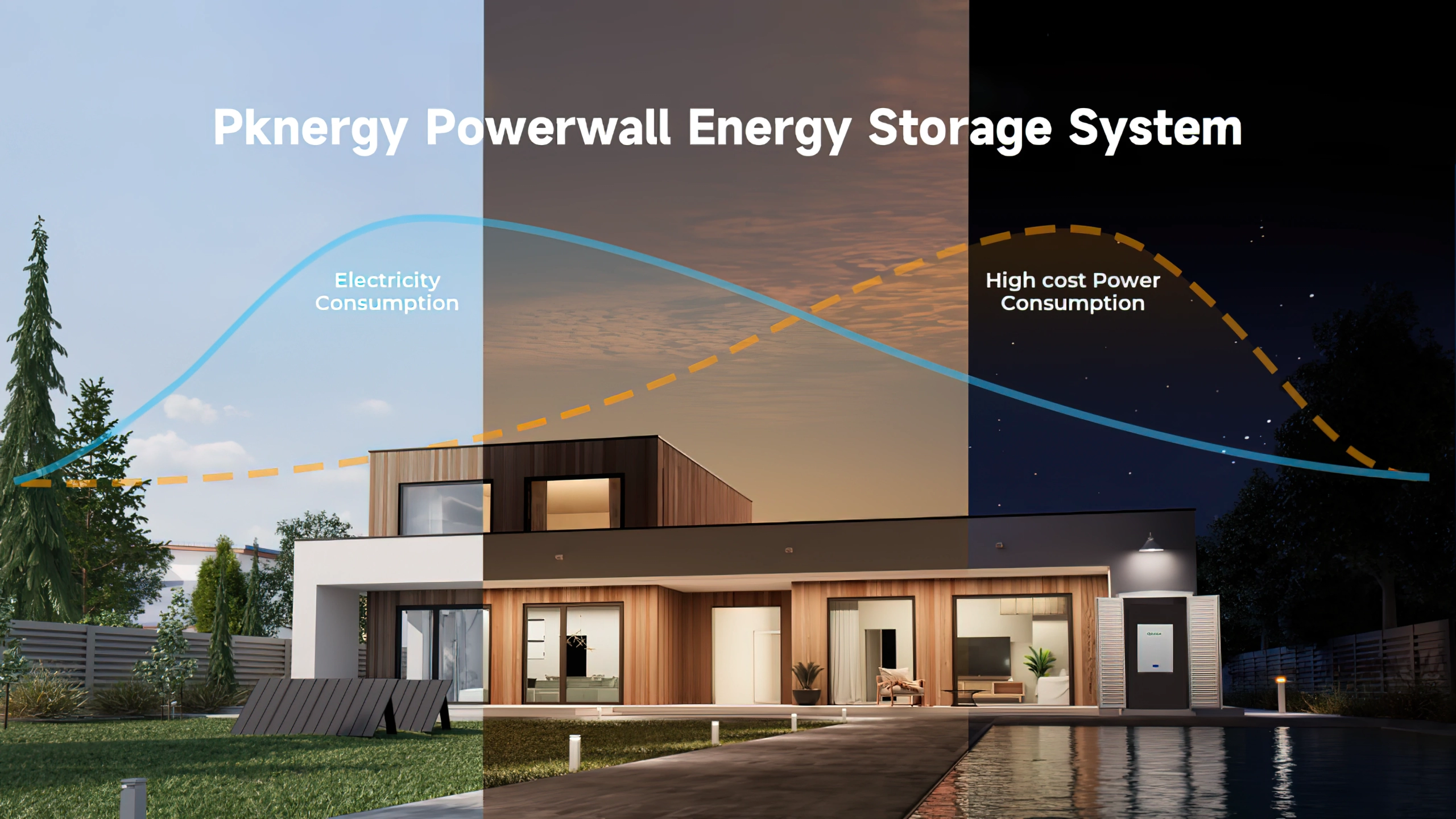The ultimate home backup energy battle: Which is the best choice, energy storage batteries or generators?
When you’re working hard or playing games, it’s always frustrating to lose energy. In order to avoid having nothing to do due to power outages, people will want to add an energy system to their houses so that they can still live normally when the power grid stops functioning for some reason. Today, people generally choose energy storage batteries or generators as their options to combat risks. So which one of them is the first choice?
In the not-too-distant past, traditional fuel-fired generators were still the only option for powering homes, as long as a generator was powered it could produce virtually unlimited energy. After the rapid development of lithium batteries in the past few years, lithium batteries have gradually been chosen by many families due to their increasingly lower cost prices, quietness, greenness and environmental protection. Batteries and generators both provide the same basic service, but they are very different devices. We’ll run through the pros and cons of each.
Overview: Generator
The working principle of a generator is actually very simple. It uses the power generated by the combustion of fuel or other energy sources (such as natural gas or diesel) to drive an engine, and then the engine drives the generator rotor to rotate. As the rotor spins, the coils induce a current in the magnetic field, producing electrical energy. This electrical energy is then transmitted through wires to our home devices, providing us with electricity.
According to the different “food” required by the generator, we usually divide the generator into:
Generator Comparison
| Generator Type | Working Principle | Features | Energy Conversion Rate | Advantages | Disadvantages |
|---|---|---|---|---|---|
| Internal Combustion Generator | Uses various fuels to drive the generator | Simple structure, stable operation, suitable for small power needs | 25% - 35% | Simple structure, quick start, versatile fuel options | Higher operating costs, noise and vibration, emissions, regular maintenance required |
| Diesel Generator | Utilizes a diesel engine to drive the generator | Durable, affordable, suitable for long-term and high power output | 30% - 40% | Fuel-efficient, durable, stable operation | Longer start-up time, emissions, complex fuel storage, higher initial investment |
| Gasoline Generator | Operates using a gasoline engine | Easy to start, portable, suitable for temporary low-power needs | 20% - 30% | Easy start, portable, suitable for temporary needs | Lower fuel efficiency, limited application, noise and vibration, regular maintenance required |
| Wind Turbines | Utilizes wind energy to rotate turbine blades and generate electricity | Clean energy, environmental protection, suitable for windy areas | 30% - 40% | Clean energy, renewable, low maintenance | Unstable power generation, high initial investment, environmental impact, large footprint |
| Solar Generator (Photovoltaic) | Converts solar energy into electricity using photovoltaic panels | Renewable energy, zero emissions, suitable for remote areas | 15% - 25% | Clean energy, silent operation, low maintenance costs | Variable power generation, high initial investment, requires ample installation space |
Overview: Energy Storage Batteries
An energy storage battery is a device used to store electrical energy, usually consisting of electrochemical cells. Its main function is to store electrical energy when there is excess power supply or during off-peak hours, so that it can be released when demand peaks. This technology helps balance the difference between power supply and demand, improves the stability and reliability of the power system, and also promotes the use of renewable energy.
Energy storage batteries can be combined with renewable energy systems (such as solar panels, wind turbines, etc.) to store the electricity collected through these systems for use when day and night changes or weather is unstable. Once a power outage occurs, the energy storage battery will automatically start to provide you with emergency power support. You can use your home appliances as usual and enjoy a continuous and stable power supply.
The energy storage batteries usually used by people can be divided according to chemical materials:
Battery Comparison
| Battery Type | Advantages | Disadvantages |
|---|---|---|
| Lead-acid battery |
|
|
| Lithium-ion battery |
|
|
Generator VS Energy storage battery
Size- Winner: Energy Storage Battery
Nowadays, some solar generators are smaller than previous generators, but solar generators cannot help you solve your household electricity needs on nights when there is no sun. (If it is not equipped with a battery for energy storage.) But if a 5kw diesel generator equipped with an internal combustion engine, the size is usually 900mm*600mm*600mm. This is because the large energy generated during operation requires the relevant parts to have high structural strength and rigidity, so the diesel generator is larger.
Energy storage batteries, on the other hand, are much smaller. Take the Pknergy 10KW battery as an example. Its size is 580*390*185 mm, and it is a wall-mounted battery that can be placed comfortably next to solar equipment, garage shelves, etc.
Continuous Power Time – Winner: Generator
The generator can continuously generate electricity through fuel, so when the fuel supply is sufficient, it can provide continuous power supply for a long time, which is suitable for long-term power outages. In some countries, gas pipelines can be linked to generators, which ensures long-term operation of the generator.
Energy storage batteries are not as good as generators in this regard, when the stored energy is exhausted. It can only be used normally by replenishing energy, but if your battery system is large enough and connected to a large solar system, it can still ensure that the battery runs 24 hours a day. See more about off-grid solar systems.
User Experience – Winner: Energy Storage Battery
If you’ve ever seen a generator running, you’ll notice the sound it makes. The generator operates at a whopping 8.5 decibels, somewhere between a police siren and a lawnmower. If you need to use it at night or for long periods of time, it’s best to be prepared to appease your neighbors. At the same time, noisy sounds will also affect your normal life.
In contrast, energy storage batteries are quieter because they don’t need to burn anything. In fact, many times you don’t notice whether the energy storage battery is powering you. After a while, you check the APP that can monitor the battery and you will find that it is working.
Instantaneous Power – Winner: Generator
The instantaneous power of a generator is usually higher. Generators can provide instantaneous high power output when needed to start equipment, start motors or cope with sudden load increases. This capability makes the generator ideal for handling temporary high power demands, especially where emergency backup power is required.
The generator’s high instantaneous power means it can respond quickly and provide additional power output to meet the system’s high power needs during a specific period of time.
With a traditional generator, you don’t have to worry about critical loads. As long as you choose the right size generator and you have enough fuel on site, you should be able to keep your home or business running normally.
Safety – Winner: Energy Storage Batteries
Traditional generators must use fuel to generate electricity, and incomplete combustion may produce toxic gases.
In fact, when Hurricane Irma hit Florida, Georgia, and North Carolina in 2017, generators caused more deaths from carbon monoxide poisoning (16) than the hurricane itself (11).
Moreover, generators need to store fuel, such as flammable liquids such as gasoline or diesel. This will undoubtedly greatly increase safety risks.
Compared with energy storage batteries, they are not so dangerous. Energy storage batteries can store electricity from the grid or solar power without requiring additional storage of fuel. Especially LiFePO4 batteries, which are now popular in the market, are safer than lead-acid batteries. Because lithium batteries do not contain any harmful elements and are resistant to high temperatures. The chemicals used make it non-explosive.
Flexibility – Winner: Generator
Many generators are “portable,” allowing homeowners to move them anywhere they need emergency backup power. The generator itself is a factory that produces energy, and they can work for you as long as they can provide fuel. Energy storage batteries require a fixed charging location. Although there are some portable solar storage batteries on the market, their power is very small. Can only be used for a short period of time.
Durability – Winner: Energy Storage Batteries
Energy storage batteries have certain advantages over generators in terms of maintenance. Maintenance work is relatively simple and mainly focuses on regular inspections, keeping clean, and managing charge and discharge. The maintenance of generators is relatively complex and involves many aspects such as mechanical components, fuel management and cooling systems, requiring more manpower and resource investment.
In most cases, the warranty period of energy storage batteries is longer than that of generators. Usually the warranty period of energy storage batteries is 10 years.
Sensitivity – Winner: Energy Storage Battery
Energy storage batteries are the biggest winner in this regard. It detects a mains power outage within milliseconds and supplies the computer immediately. You, and not even the appliances, will be affected in any way. You don’t realize there’s a power outage until it sends you a message. Generators often take several seconds to start, which is unacceptable when manually starting a generator in a dark environment. And you may also need to add fuel to the generator.
Elsewhere – Winner: Energy Storage Batteries
The biggest advantage of energy storage batteries over generators is in daily life where power outages do not occur. While we’re talking about backup power, the time when the power won’t go out is the primary time. Generators cannot do anything to help homeowners during these times. The energy storage battery can stabilize the current when the power grid fluctuates.
If the electricity prices in your area fluctuate, then energy storage batteries can save you some electricity bills. You can store electricity when prices are low and then use it when prices peak. If you have a solar system, then you can store excess energy. In addition, batteries are eligible for incentives such as tax credits and rebates, which can significantly reduce upfront costs.
Cost – Winner: Generator… but no
Energy storage batteries are far more expensive than generators in terms of a lump sum. But if you factor in usage, the upfront payment you make isn’t the only cost to consider. If you install a generator, you will have to purchase fuel to keep it running. If you rely on a generator regularly, fuel costs can increase, especially if you also have to pay for fuel delivered to your home or business.
On average, the price to purchase and install a backup generator ranges from $7,000 to $15,000. However, keep in mind that a generator requires fuel to run, which will increase your operating expenses. The exact cost depends on several factors, including the size of the generator, the type of fuel used, and the amount of fuel used to run the generator.
And some states offer incentives for battery systems. Maryland currently offers a state tax credit for 30 percent of the cost of a battery system, up to $5,000 for homeowners and $75,000 for businesses. Other states, such as New York and New Jersey, are considering incentives and may soon follow Maryland’s lead. These incentives are not available with generators.
Some conclusions
From the above discussion you can draw some conclusions as to whether a generator or energy storage battery is right for you. Although in terms of the most immediate upfront installation cost, a generator is a good option.
However I still recommend choosing energy storage batteries as your home backup energy source because they are safer, more efficient, and a better option in the long run. Homeowners will increasingly rely on batteries rather than generators for their backup needs. For the sake of public health and the fight against climate change, this is something we can all celebrate.
Don’t know what kind of energy storage battery to choose? Contact Pknergy now to get your free energy storage battery advice!
Save Money, Protect Environment
PKNERGY helps you reduce your energy bills for your home solar energy storage, store your solar energy for use anytime- at night or during an outage.






